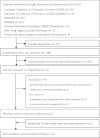Effectiveness of acupuncture and related therapies for palliative care of cancer: overview of systematic reviews
- PMID: 26608664
- PMCID: PMC4660374
- DOI: 10.1038/srep16776
Effectiveness of acupuncture and related therapies for palliative care of cancer: overview of systematic reviews
Abstract
Acupuncture and related therapies such as moxibustion and transcutaneous electrical nerve stimulation are often used to manage cancer-related symptoms, but their effectiveness and safety are controversial. We conducted this overview to summarise the evidence on acupuncture for palliative care of cancer. Our systematic review synthesised the results from clinical trials of patients with any type of cancer. The methodological quality of the 23 systematic reviews in this overview, assessed using the Methodological Quality of Systematic Reviews Instrument, was found to be satisfactory. There is evidence for the therapeutic effects of acupuncture for the management of cancer-related fatigue, chemotherapy-induced nausea and vomiting and leucopenia in patients with cancer. There is conflicting evidence regarding the treatment of cancer-related pain, hot flashes and hiccups, and improving patients' quality of life. The available evidence is currently insufficient to support or refute the potential of acupuncture and related therapies in the management of xerostomia, dyspnea and lymphedema and in the improvement of psychological well-being. No serious adverse effects were reported in any study. Because acupuncture appears to be relatively safe, it could be considered as a complementary form of palliative care for cancer, especially for clinical problems for which conventional care options are limited.
Figures
References
-
- International Agency for Research on Cancer, GLOBOCAN 2012: Estimated Cancer Incidence, Mortality and Prevalence Worldwide in 2012. (2012) Available at: http://globocan.iarc.fr/Pages/fact_sheets_population.aspx. (Accessed: 9th November 2014).
-
- World Health Organization, WHO Definition of Palliative Care. Available at: http://www.who.int/cancer/palliative/definition/en/. (Accessed: 9th November 2014).
-
- Levy M. H. et al. NCCN clinical practice guidelines in oncology: palliative care. J Natl Compr Canc Netw 7, 436–473 (2009). - PubMed
-
- Anonymous. Too much treatment? Aggressive medical care can lead to more pain, with no gain. Consum Rep 73, 40–44 (2008). - PubMed
Publication types
MeSH terms
LinkOut - more resources
Full Text Sources
Other Literature Sources
Medical


